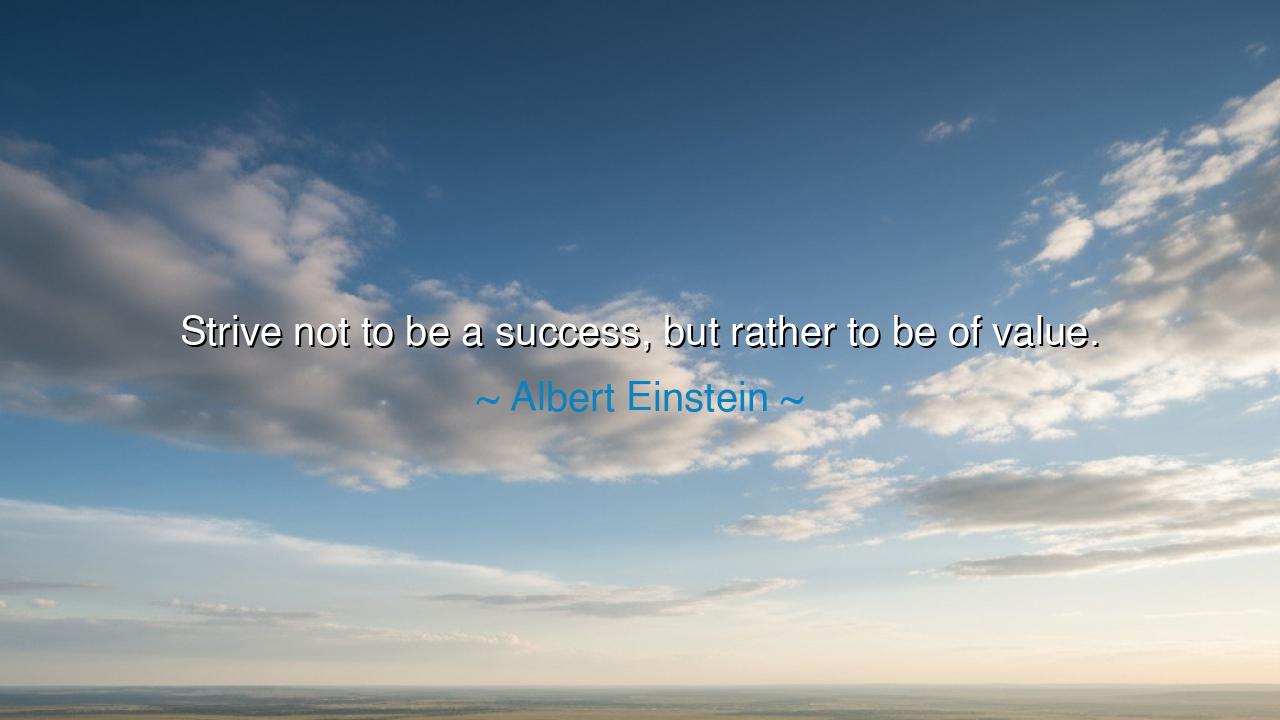
Strive not to be a success, but rather to be of value.






Listen, O seekers of wisdom, to the words of Albert Einstein, a man whose name is synonymous with genius and whose contributions to science changed the course of history. He said, "Strive not to be a success, but rather to be of value." These words speak to a truth that transcends the pursuit of fame, wealth, and recognition—the understanding that the greatest achievement in life is not found in external success, but in the impact we have on others and the world around us. To strive for value is to seek something deeper than accolades or rewards; it is to live in a way that enriches the lives of those we encounter, leaving a lasting mark on the world.
To understand this profound teaching, let us reflect on the nature of success. In the world of the ancients, success was often defined by wealth, power, or victory in battle. The great pharaohs of Egypt, the emperors of Rome, and the mighty warriors who shaped the fate of civilizations were often celebrated for their conquests and their dominion over others. Yet, even as they built their empires, their legacies were not always as enduring as they imagined. For true greatness does not lie in the acquisition of things, but in the ability to serve others, to bring about change, and to improve the world. Success, in the ancient world, was often fleeting, while the true value of a person, a life, or an action endures across generations.
Consider the example of Socrates, who lived not for fame or wealth but to uncover truth. He was a man who gave up his wealth, his status, and his comfort to teach the people of Athens, challenging them to think deeply about their lives and their choices. His success was not measured by the acclaim of his contemporaries but by the value of his ideas, which continued to shape the very foundation of Western thought. Socrates’ life teaches us that true greatness is not found in superficial success, but in the service of ideas that transcend the moment and echo through the ages.
Similarly, consider Mahatma Gandhi, whose life was dedicated not to the pursuit of personal success, but to the value of justice, freedom, and equality for all. Gandhi lived a simple life, free from the trappings of wealth or power, but his impact on the world was immeasurable. He fought not for glory, but for the liberation of his people. The success of his struggle was not in the victories he won, but in the enduring value of his principles—the idea that one could change the world through nonviolence and truth. His legacy endures not because he sought to be successful, but because he valued human dignity and equality above all else.
In our own lives, the lesson is clear: seek not to be successful, but to be valuable. Success is a transient measure, and while it can bring comfort or recognition, it does not always bring fulfillment or a sense of purpose. To be of value is to live in service to something greater than ourselves—to contribute to the world in ways that transcend personal gain. Whether in our work, our relationships, or our creative pursuits, we must strive to make a difference, to improve the lives of those around us, and to leave behind a legacy that is rooted in meaning and compassion.
Look to the great thinkers, the creators, and the leaders of history who have shaped the world not by their desire for success, but by their commitment to value. The Renaissance artists like Leonardo da Vinci and Michelangelo did not create masterpieces to become wealthy or famous. They created to express their vision, to uncover the depths of human experience, and to enrich the world with their art. Their work has endured not because they sought success, but because they sought to be of value—to create something that would inspire and transform the generations that followed.
And so, O children of the future, take this wisdom to heart: in your pursuit of life’s goals, do not chase success alone. Let value guide you. Strive not for the fleeting glory of external achievement, but for the lasting impact of a life well-lived. Whether in your work, your art, your relationships, or your actions, aim to make a difference. Let the legacy you leave behind be one of service, of meaning, and of authenticity. Like Einstein, let your life be a reflection of the value you create in the world, and may that be your truest measure of success.






AAdministratorAdministrator
Welcome, honored guests. Please leave a comment, we will respond soon